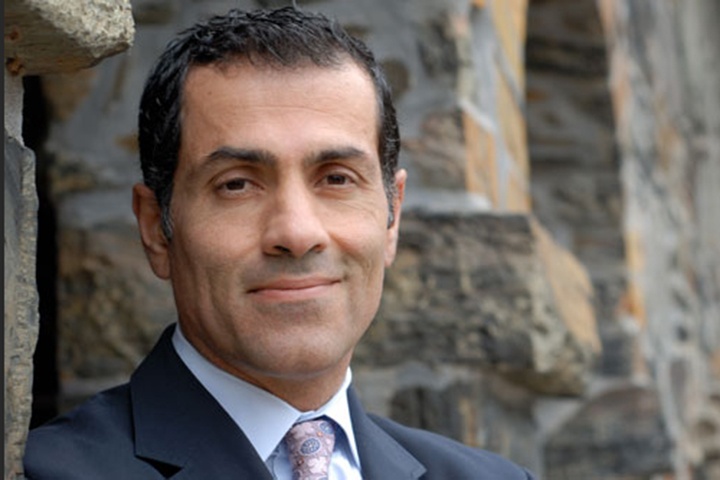Alumni Spotlight: Vali Nasr, PhD, 1991
Insight on Islamic Politics

Vali Nasr, PhD, 1991
When the Islamic revolution swept through Iran in 1979, 18-year-old Vali Nasr was forced to flee. But while Nasr and his immediate family distanced themselves geographically from the turmoil, eventually settling in the United States, Nasr in some sense never traveled far from home. He embarked on an education, and subsequently a scholarly mission, to come to terms with the rise of Islam in politics. "I was driven by the intellectual weight of this world event that had affected my life directly," he says.
Recently appointed dean of The Johns Hopkins University's Paul H. Nitze School of Advanced International Studies, Nasr got his academic start in the Boston area, where he developed deep roots. He received his undergraduate degree from Tufts University, and also served there as a professor of international politics. In 1991, he earned his political science doctorate at MIT, which his father had also attended as the Institute's first Iranian undergraduate.
Nasr says he benefited not just from close personal and intellectual bonds with mentors Lucian Pye and Myron Weiner, but from the political science department's "new approaches and attitudes," including an openness to interdisciplinary study and multiple methodologies. Even more important, the department encouraged Nasr to pursue subjects quite out of the political science mainstream then: the role of Islam in national and global politics, and its impact on state building and democratization. "If I had gone elsewhere, I wouldn't have studied these," he states.
Not only did MIT's political science department validate the importance of interpreting events "actually happening in the real world," but it helped frame Nasr's commitment to "bridging intellectual life and public policy work." A prodigious output of best-selling books, journal articles, and newspaper columns, as well as appearances on a wide range of TV programs, attests to his enterprise as a self-described "public scholar." Nasr believes he has a critical role to play in narrowing the divide between America and the larger Muslim world. "In the past 30 years, America has gone from crisis to larger crisis in dealing with the region. The scope of problems has grown faster than Americans are able to grapple with," says Nasr. "For economic, political and security reasons, this knowledge gap must be urgently addressed."
With his deep understanding of Islamic culture, and extensive contacts across the Middle East and South Asia, Nasr does battle against "stereotypes, biases, and short-hand conclusions about the region." His nuanced descriptions of the social, economic and political concerns of the diverse groups who live there have proven invaluable to foreign policy decision makers. From 2009 to 2011, Nasr was senior advisor to the late Ambassador Richard Holbrooke, then U.S. special representative for Afghanistan and Pakistan. Nasr's incisive memos directly informed President Obama's response to the Taliban's military advances in Pakistan's Swat Valley. He currently serves on the Secretary of State's foreign affairs policy board, advising on such vital matters as the conflict in Syria, and nuclear negotiations with Iran. "These are big topics with many stakeholders," says Nasr. "You can make an impact, sometimes bigger, sometimes less."
Nasr attributes some of his influence to a demonstrated knack for anticipating major trends. His 2007 book, The Shia Revival: How Conflicts within Islam will Shape the Future, explored the historical roots of the schism between Shia and Sunni Muslims and traced how clashes between the two sects would inflame first Iraq and then much of the Middle East -- a prediction that is playing out now. The Rise of Islamic Capitalism (2010) described an emergent middle class across the Middle East that aspires to a decent quality of life. This turned out to be "the force that started the Arab spring," notes Nasr.
In his latest research and public commentary, Nasr worries that the U.S. will fail to seize a unique opportunity open now in the Middle East. "The single biggest missing piece in Western engagement with the Arab spring is a lack of enthusiasm for economic restructuring. We use our concern about Islam as an excuse, and put too much blame on dictatorship and fundamentalism." Take Egypt, where the economy can't produce jobs, says Nasr, and 40% of its citizens live on $2 a day. Without help from the international community in transforming its economy, "Egypt will remain closed, dominated by the military, and continue not only to wallow in poverty, but disconnected from the world, and hanging on to all manner of ideologies," says Nasr.
"The game in the region is not about extremism," but about embracing the kinds of economic growth that have transformed Turkey, Indonesia and Dubai. Religious moderation will follow restructuring, suggests Nasr, and it is in the best interests of the U.S. to help "the Muslim world find its own path in history, a good path." Two wars in the region have already cost the U.S. $2 trillion and we now face the "serious potential" of a conflict with Iran, not to mention continued uncertainty about the futures of Syria, Afghanistan and Iraq. Reform will only come by integrating the nations of this region into the global economy. "There are not enough things in Walmart that say 'Made in the Arab world,'" says Nasr.